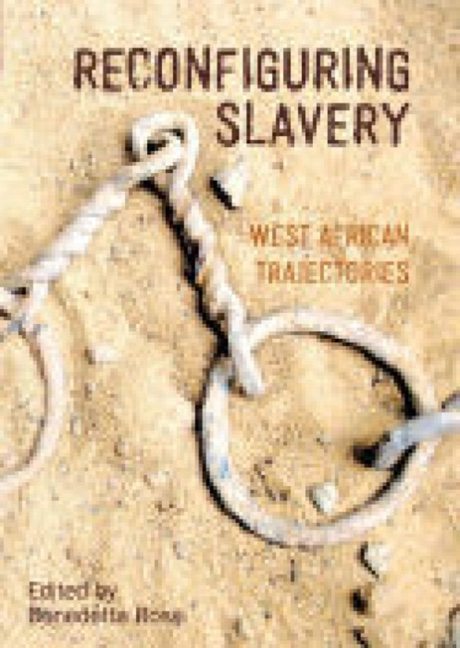Book contents
- Frontmatter
- Content
- List of Figures
- Notes on Contributors
- Preface
- A Note on Language
- Preface to the Second Edition
- 1 Introduction: Rethinking Slavery in West Africa
- 2 Slave Descent and Social Status in Sahara and Sudan
- 3 African American Psychologists, the Atlantic Slave Trade and Ghana: A History of the Present
- 4 After Abolition: Metaphors of Slavery in the Political History of the Gambia
- 5 Islamic Patronage and Republican Emancipation: The Slaves of the Almaami in the Senegal River Valley
- 6 Curse and Blessing: On Post-slavery Modes of Perception and Agency in Benin
- 7 Contemporary Trajectories of Slavery in Haalpulaar Society (Mauritania)
- 8 Slavery and Politics: Stigma, Decentralisation and Political Representation in Niger and Benin
- 9 Slavery and Migration: Social and Physical Mobility in Ader (Niger)
- 10 Discourses on Slavery: Reflections on Forty Years of Research
- Glossary of Foreign Words
- Index
7 - Contemporary Trajectories of Slavery in Haalpulaar Society (Mauritania)
- Frontmatter
- Content
- List of Figures
- Notes on Contributors
- Preface
- A Note on Language
- Preface to the Second Edition
- 1 Introduction: Rethinking Slavery in West Africa
- 2 Slave Descent and Social Status in Sahara and Sudan
- 3 African American Psychologists, the Atlantic Slave Trade and Ghana: A History of the Present
- 4 After Abolition: Metaphors of Slavery in the Political History of the Gambia
- 5 Islamic Patronage and Republican Emancipation: The Slaves of the Almaami in the Senegal River Valley
- 6 Curse and Blessing: On Post-slavery Modes of Perception and Agency in Benin
- 7 Contemporary Trajectories of Slavery in Haalpulaar Society (Mauritania)
- 8 Slavery and Politics: Stigma, Decentralisation and Political Representation in Niger and Benin
- 9 Slavery and Migration: Social and Physical Mobility in Ader (Niger)
- 10 Discourses on Slavery: Reflections on Forty Years of Research
- Glossary of Foreign Words
- Index
Summary
This chapter focuses on the contemporary situation of slavery among the Haalpulaar maccuBe of Mauritania. It looks at the main forms of discrimination the maccuBe are facing today and at their resistance to it. First, then, we should remember that slavery is still a very topical issue in Mauritania. The latest official abolition of slavery only dates back to 1981 and more recently the Mauritanian National Assembly adopted, on 8 August 2007, a law criminalising slavery (see Klein, in this volume). More and more movements of emancipation among the descendants of slaves, in Moorish (Brhane, 1997) as well as in Haalpulaaren societies, have arisen in recent years. Today the question of slavery cannot be approached in the same way as in the late nineteenth century, when masters could exercise property rights on their slaves. It is nonetheless the case that groups of servile origin continue to face various forms of discrimination that, in today's contexts, give rise to increasingly frequent social conflicts. These conflicts reveal the persistence of inequalities and the ongoing relevance of the traditional Haalpulaar hierarchy, which still characterise all those contexts where persons must be classified socially and attributed a place in the social order. At the same time, conflicts also constitute evidence that change has indeed been happening. In fact, most conflict situations are less the result of the nobles’ power to force slaves to perform tasks, as was the case in the past, than they are the consequence of the claims of slave descendants to gain rights and responsibilities that had, until now, been denied to them. Yet contemporary social conflicts are primarily about crossing social boundaries, and only secondarily, if at all, about challenging and transforming these boundaries. By discussing various forms of discrimination and resistance, this chapter enquires into the tension between the maintenance of a hierarchical social order, and the process of social change and emancipation that the maccuBe are undergoing. It sets out to show that, in spite of the ongoing debate and negotiation over social categories, formal hierarchies have been maintained.
- Type
- Chapter
- Information
- Reconfiguring SlaveryWest African Trajectories, pp. 140 - 151Publisher: Liverpool University PressPrint publication year: 2009



